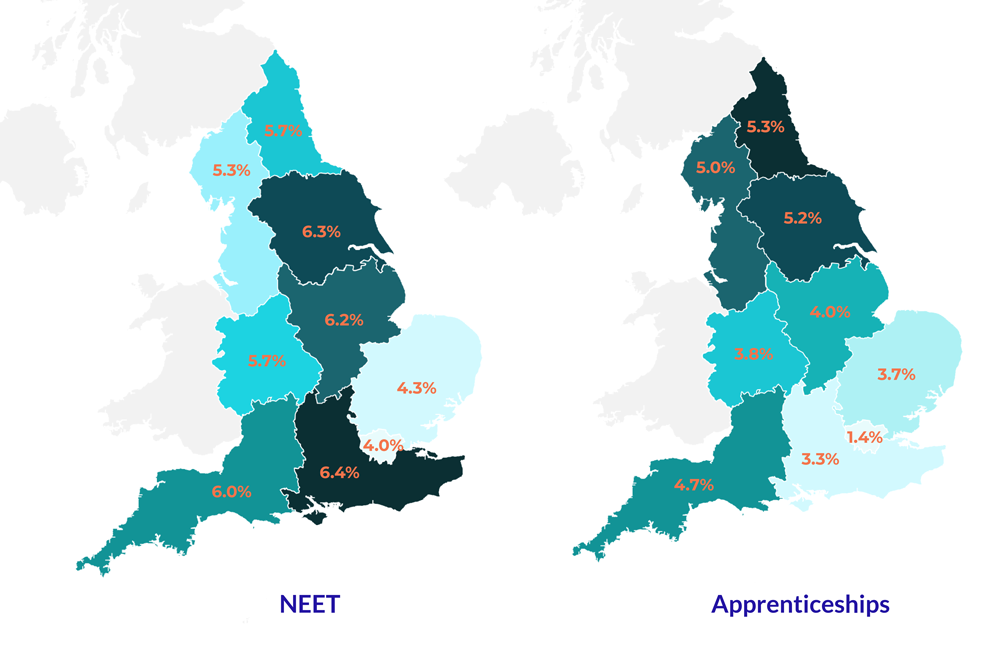Levelling up participation by 16-18 year olds
25 Mar 2022
Becci Newton, Director, Public Policy Research
This analysis was originally published in Campaign for Learning's Post-16 Education and Skills: Levelling Up Everyone, Everywhere. The Campaign for Learning’s report is a collection of 18 articles and recommendations by leading stakeholders and thinkers across the post-16 education and skills sector.
__________________________
The long overdue Levelling Up white paper contains ambitions that are hard to dispute. A policy to transform the UK economy through a place-based approach, to more equally share prosperity across the country and within regions has long been needed.
The white paper envisages a new renaissance - a ‘contemporary Medici model’, boosting productivity, improving public services, restoring a strong community ethos, and empowering local leadership. And it recognises that to catalyse this crucial change addressing the six capitals: physical, human, intangible, financial, social and institutional is central.
Geographical Mobility: Higher Education and Apprenticeships
Digging into the analysis on human capital, however, the vision for the large part is informed by the transformative role of higher education for individuals and society. The benefits of higher education are greater social and geographic mobility, the latter being an important factor in accessing good quality work.
Levelling up, however, should mean geographic mobility is less necessary. Nonetheless the analysis misses a trick. It fails to grasp a key element of how skills were developed in the renaissance.
Apprenticeships get their first mention in a footnote on page 127 of the Levelling Up White Paper. It is not until page 226 (of 305 pages) that we see any substantive content. Here we find a brief commitment to encouraging uptake of apprenticeships by small and medium sized enterprises because they are more likely to take on younger apprentices.
However, there is no clear vision connecting apprenticeships to social and economic outcomes. Coming so soon after the new vision for increasing STEM skills was launched, with its focus on academic qualifications and lack of regard to technical routes, it is hard to see technical and vocational education as other than the poor cousin.
In contrast, apprenticeships played a crucial role in the renaissance. There are strong links to mobility: the model enabled young people to study with a master to acquire skills, to become journeymen who travelled to apply and master those skills before themselves becoming masters and training the new generation. This process helped spread skills beyond the local area and enabled individuals and economies to see returns, sharing prosperity in ways envisaged by levelling up.
Levelling Up and the Apprenticeship Route for 16-18 Year Olds
In better embedding apprenticeship within the Levelling Up vision, we need to throw a spotlight on optimising the route for the young people, especially 16-18 year-olds.
There was a 25% reduction of the 16-18 age group in apprenticeships between 2015/16 and 2019/20. And yet, whilst tentative, analysis suggests that young people taking apprenticeships see better economic returns over attaining the same level of vocational qualification in classroom settings.
Participation in Apprenticeships by 16-18 Year-Olds by Region
The Levelling Up agenda needs a clear vision for furthering apprenticeships in those regions where it remains a strong option of choice and opportunity, while supporting other regions into catch up mode on delivery.
Existing hot spots with high rates of youth participation in apprenticeship are the northern powerhouse regions – the North West and the North East - alongside the South West. Participation in these regions ranges from 5.3% to 4.7% whilst the average in England is 3.8%.
Participation in Jobs without Apprenticeships by 16-18 Year-Olds by Region
Additionally, more young people in the North West, North East and South West enter the labour market at age 16 or 17, through taking up other forms of work-based learning, or a combination of employment and study. This is in contrast to London where the vast majority enter full-time further education (see Figure 1). In the North West, for example, 9.4% of 16-17s participate in some combination of work and study. This compares to an average of 5.5% across England.
Figure 1

Source: DfE Participation Data: 16-17 year olds recorded in education and training and NEET by local authority, 2021
Preventing 16-18 Year-Olds becoming NEET Everywhere in England
The data show that rates of NEET (Not in Education, Employment or Training) are now pretty intractable, showing far less positive change than those for overall participation. Should apprenticeship and work-based routes be further undermined, we will see rising rates of NEET in those very areas where we need to increase the share of prosperity. New institutions focused on academic skill sets will not be the solution for these young people.
An Apprenticeship-Led Renaissance
We need to achieve a new apprenticeship-led renaissance. This is vital if we are to level up opportunities for every 16-18 year-old wherever they live in England.
Recommendation 1
We should establish regional and place-based brands, and ‘one-stop shops’ will be key, as SMEs will not engage with a complex system. This one-stop shop can be the go-to resource for schools to overcome the problem of not knowing how to support transitions to apprenticeship, and so defaulting to helping young people to secure post-16 education destinations.
Recommendation 2
We need to develop collaboration between providers and with local economic bodies, Chambers of Commerce and Local Enterprise Partnerships, as well as embedding the apprenticeship vision in policies including Local Skills Improvement Plans alongside Strategic Development Fund plans.
Recommendation 3
For the youngest age groups to succeed, we need to ensure Level 2 is embedded in the apprenticeship standard and that the standard then allows the progression to Level 3, where occupations require this. Functional maths and English skills are what employers want.
_____________________________________________
Any views expressed are those of the author and not necessarily those of the Institute as a whole.


